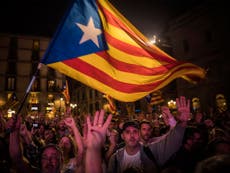Stubborn schoolboy tactics have plunged Spain and Catalonia into political crisis
Within a day, Catalonia has lost autonomy while Spain has thoughtlessly called for new elections
After a night of jubilation and Cava drinking for pro-independence Catalans who were celebrating the region declaring itself a republic on Friday, chaos quickly descended.
The Spanish government – after voting to invoke Article 155 of its Constitution – dissolved the Catalan parliament, sacking Catalan President Carles Puigdemont and his ministers, and called regional elections for 21 December.
The head of the Catalan police, the Mossos d’Esquadra, was also fired, although it it unclear whether the region’s 17,000-strong force will take orders from Madrid.
The move from the Spanish Senate to assume control of the autonomous region, including its police, public media and finances, came minutes after Catalan MPs voted in secret to declare independence, by 70 votes to 10 in the 135-seat chamber. Many MPs who do not support independence boycotted the vote.
Friday’s events have plunged Spain deeper into its worst political crisis in decades and many observers are now wondering what will happen next.
Catalonia has, within a day, declared independence and lost its autonomy, while Spanish Prime Minister Mariano Rajoy has called new elections but seemingly not thought about what will happen if independence parties win again in December.
The two politicians have been acting like stubborn schoolboys, blind and deaf to any other arguments but their own.
Puigdemont has pushed ahead with his independence plan, ignoring at least half of Catalans, who are against independence. In the October 1 referendum, 90 per cent voted for independence, but only 43 per cent turned out, with the vast majority of Catalans against independence staying at home.
He has ignored opposition parties and his vision for an independent republic apparently ignores the views of half the population.
Despite trying to gain EU support, many countries, including the UK, France, the USA and even Catalonia-friendly Scotland, refused to recognise the new Catalan republic on Friday.
Puigdemont also seems unconcerned by the now more than 1,500 companies – from Catalonia’s biggest banks to some of its iconic Cava producers – that have moved their headquarters from the region citing the volatile political situation.
Rajoy, on the other hand, has completely ignored the growing crisis in Catalonia and the legitimate grievances of many of its people. The opinion of over two million Catalans cannot be ignored, but Rajoy has appeared to have done so.
What does Rajoy hope to achieve by calling regional elections for 21 December? He no doubt hopes that anti-independence parties, such as the centre-right Ciudadans, the Socialist Party and his own conservative Popular Party, will triumph, but that is by no means guaranteed.
His ham-fisted reaction on polling day, sending in Guardia Civil and national police whose violence shocked the world, was disproportionate, and may have served to push more on-the-fence Catalans towards the independence cause.
The Catalan crisis seems severely polarised but there have been voices calling for an alternative solution from the beginning.
Ada Colau, the left-wing Mayor of Barcelona, reacted to Friday’s events in a lengthy Facebook post, in which she not only described the invoking of Article 155 as a “blow to democracy” but also accused the Catalan government of advancing only “partisan interests” that “culminated today with the Declaration of Independence in the name of Catalonia that doesn’t have the support of the majority of Catalans”.
She called for “dialogue, common sense and an agreed solution” and added, “Not in my name, no to 155 no to DUI [unilateral declaration of independence].”
Colau and her Madrid counterpart, Mayor Manuela Carmena, were widely praised when, just days before the referendum, they appeared together on Spanish news satire programme El Intermedio.
They debated the issue of Catalonia calmly and many took to social media to commend their “cordiality” and “good sense”.
It is unlikely Rajoy’s calling of another election will calm the situation. Over two million Catalans are unlikely to change their pro-independence views, whatever the result.
Perhaps if Puigdemont and Rajoy had been more willing to listen to opposing viewpoints, as well as each other, Spain would not be facing this crisis.



Join our commenting forum
Join thought-provoking conversations, follow other Independent readers and see their replies